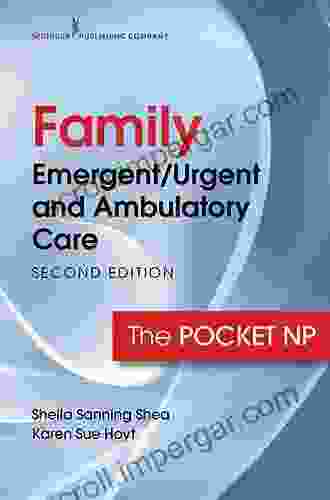Family Emergent, Urgent, and Ambulatory Care: A Comprehensive Guide to Navigating Healthcare


Navigating the healthcare system can be overwhelming, especially when it comes to urgent or emergent medical needs. Our family's well-being is paramount, so knowing how to recognize and respond to different levels of medical concern is crucial. This comprehensive guide aims to provide you with the necessary knowledge and tools to make informed decisions about seeking emergent, urgent, or ambulatory care for your loved ones.
4.5 out of 5
| Language | : | English |
| File size | : | 2469 KB |
| Text-to-Speech | : | Enabled |
| Screen Reader | : | Supported |
| Enhanced typesetting | : | Enabled |
| Print length | : | 125 pages |
Recognizing Medical Emergencies
Emergent care is required when a medical condition poses an immediate threat to life, limb, or function. Common signs of a medical emergency include:
- Sudden chest pain or shortness of breath
- Severe bleeding that cannot be stopped
- Uncontrolled seizures
- Loss of consciousness
- Head injury with loss of consciousness or confusion
If you suspect a medical emergency, call 911 immediately and provide clear and concise information to the operator.
Urgent Care vs. Ambulatory Care
Urgent care is intended for non-life-threatening conditions that require prompt medical attention but are not considered emergencies. Some common reasons to seek urgent care include:
- Fever
- Sore throat
- Minor cuts and wounds
- Urinary tract infections
- Minor fractures
Ambulatory care, on the other hand, is designed for managing chronic conditions or providing ongoing care for non-urgent health issues. These services typically involve appointments with a primary care physician, specialist, or other healthcare providers and may include:
- Wellness checkups
- Immunizations
- Disease screening
- Chronic disease management
- Rehabilitation
When to Seek Urgent or Ambulatory Care
To determine whether urgent or ambulatory care is appropriate, consider the following factors:
- Severity of symptoms: Urgent care is necessary for conditions that cause significant discomfort or impairment, while ambulatory care is suitable for milder symptoms.
- Duration of symptoms: If symptoms persist or worsen over time, urgent or ambulatory care may be required.
- Underlying health conditions: Individuals with chronic conditions or compromised immune systems may require urgent or ambulatory care sooner than those without.
- Access to care: If you have difficulty reaching a primary care physician or specialist, urgent care or ambulatory care clinics may provide convenient and timely access to medical attention.
Choosing the Right Care Setting
Depending on the nature of the medical need, there are various care settings available:
- Emergency room (ER): For life-threatening emergencies only.
- Urgent care center: For non-life-threatening conditions that require prompt attention.
- Primary care physician's office: For routine checkups, vaccinations, and managing non-urgent health issues.
- Specialist's office: For specialized care for specific medical conditions.
- Ambulatory care clinic: For ongoing care and management of chronic conditions.
Tips for Effective Care
To ensure effective care for your loved ones, follow these tips:
- Be prepared: Keep a list of your family's medical history, medications, and insurance information handy.
- Communicate clearly: Provide detailed and accurate information about the symptoms to healthcare providers.
- Ask questions: Don't hesitate to ask for clarification or additional information about the diagnosis, treatment, and follow-up care.
- Follow instructions: Adherence to treatment plans and follow-up appointments is essential for optimal outcomes.
- Build a relationship with your healthcare team: Establishing a rapport with your healthcare providers can improve communication and coordination of care.
By understanding the different levels of healthcare, recognizing medical emergencies, and choosing the appropriate care setting, you can ensure that your family receives the timely and effective medical attention they need.
For further information and guidance, consult the comprehensive resource, "Family Emergent, Urgent, and Ambulatory Care."
4.5 out of 5
| Language | : | English |
| File size | : | 2469 KB |
| Text-to-Speech | : | Enabled |
| Screen Reader | : | Supported |
| Enhanced typesetting | : | Enabled |
| Print length | : | 125 pages |
Do you want to contribute by writing guest posts on this blog?
Please contact us and send us a resume of previous articles that you have written.
 Book
Book Novel
Novel Page
Page Chapter
Chapter Text
Text Story
Story Genre
Genre Reader
Reader Library
Library Paperback
Paperback E-book
E-book Magazine
Magazine Newspaper
Newspaper Paragraph
Paragraph Sentence
Sentence Bookmark
Bookmark Shelf
Shelf Glossary
Glossary Bibliography
Bibliography Foreword
Foreword Preface
Preface Synopsis
Synopsis Annotation
Annotation Footnote
Footnote Manuscript
Manuscript Scroll
Scroll Codex
Codex Tome
Tome Bestseller
Bestseller Classics
Classics Library card
Library card Narrative
Narrative Biography
Biography Autobiography
Autobiography Memoir
Memoir Reference
Reference Encyclopedia
Encyclopedia James Clerk Maxwell
James Clerk Maxwell Gene Gurney
Gene Gurney Latoya Rose
Latoya Rose Jenifer Lewis
Jenifer Lewis W J Wood
W J Wood Lee Gilbert
Lee Gilbert Cara Harvey
Cara Harvey Johnny Chuong
Johnny Chuong Wolfgang Giegerich
Wolfgang Giegerich Carolyn Ackerly Bonstelle
Carolyn Ackerly Bonstelle Jacqueline Simon Gunn
Jacqueline Simon Gunn Carol Kramer
Carol Kramer Sigurd F Olson
Sigurd F Olson Jim Muhlig
Jim Muhlig Carla J Spinelli
Carla J Spinelli Catherine Hall
Catherine Hall C T Meek
C T Meek Cam Rea
Cam Rea Chance Roberts
Chance Roberts Sammy Franco
Sammy Franco
Light bulbAdvertise smarter! Our strategic ad space ensures maximum exposure. Reserve your spot today!

 Banana YoshimotoThe Tudors: A Captivating Guide to the Wars of the Roses and the Six Wives of...
Banana YoshimotoThe Tudors: A Captivating Guide to the Wars of the Roses and the Six Wives of... Ernest HemingwayFollow ·3.9k
Ernest HemingwayFollow ·3.9k Earl WilliamsFollow ·2.6k
Earl WilliamsFollow ·2.6k George R.R. MartinFollow ·10.1k
George R.R. MartinFollow ·10.1k Ryan FosterFollow ·15.9k
Ryan FosterFollow ·15.9k Griffin MitchellFollow ·14.2k
Griffin MitchellFollow ·14.2k Ron BlairFollow ·5.8k
Ron BlairFollow ·5.8k Angelo WardFollow ·14.2k
Angelo WardFollow ·14.2k Italo CalvinoFollow ·3.4k
Italo CalvinoFollow ·3.4k

 Henry Hayes
Henry HayesVery Short Introductions: A Gateway to Knowledge...
In the realm of academia, where vast oceans of...

 Jean Blair
Jean BlairBorn on the Third of July: An Unforgettable Journey of...
Born on the Third...

 Benjamin Stone
Benjamin StoneEnvironmental Offsets: Striking a Balance between...
In the face of pressing environmental...

 Colin Foster
Colin FosterGirl With Power: My Boyhood Bully Diary
In this gripping and...

 Colin Foster
Colin FosterUnveiling the Unseen: The Collected Works of Charles Fort
Prepare to venture into...

 Gabriel Mistral
Gabriel MistralUnveiling the Hidden World of the English Republican...
Dive into the captivating world of 'The...
4.5 out of 5
| Language | : | English |
| File size | : | 2469 KB |
| Text-to-Speech | : | Enabled |
| Screen Reader | : | Supported |
| Enhanced typesetting | : | Enabled |
| Print length | : | 125 pages |










